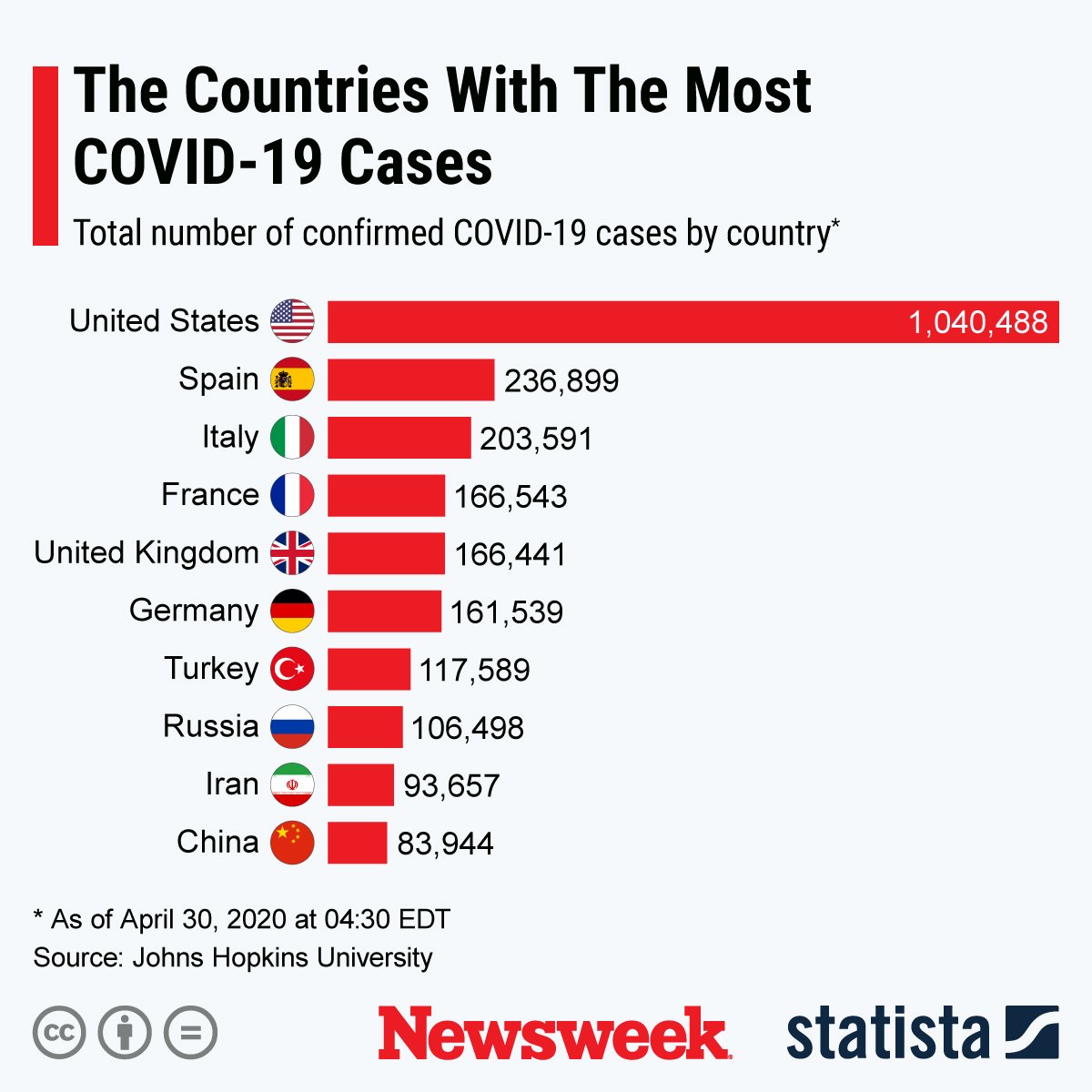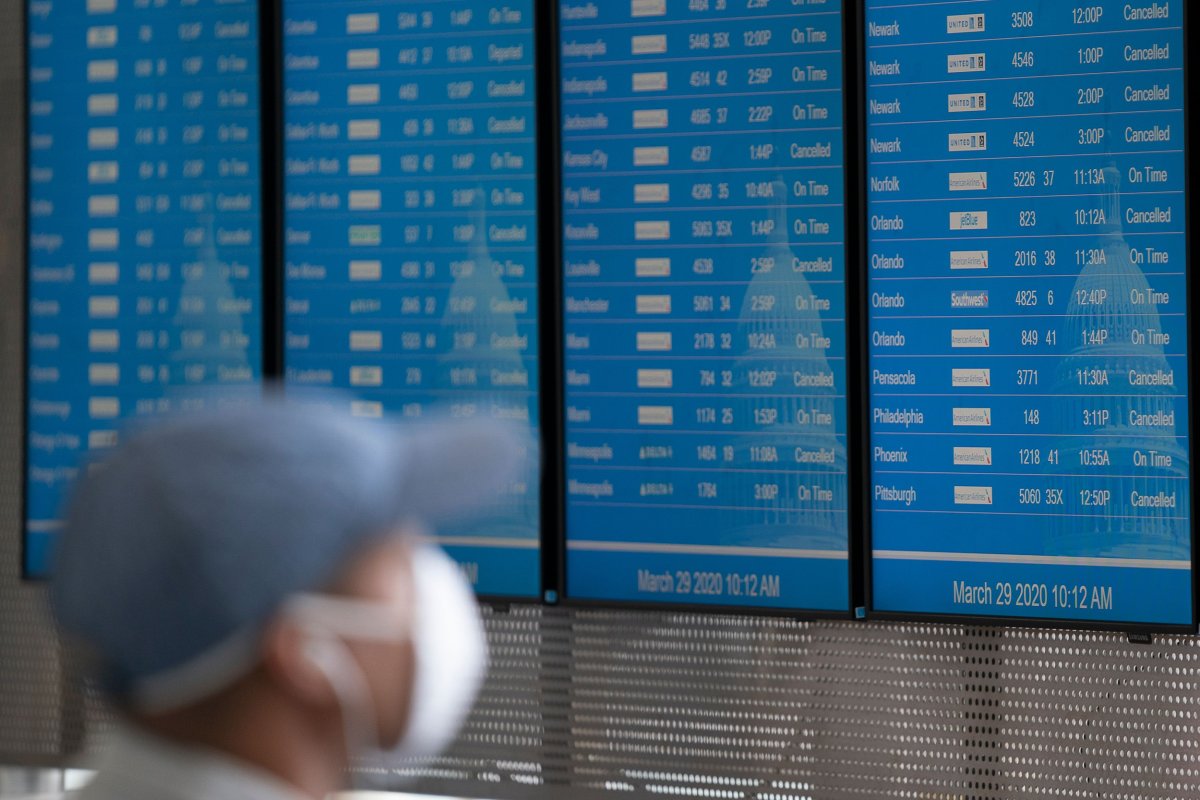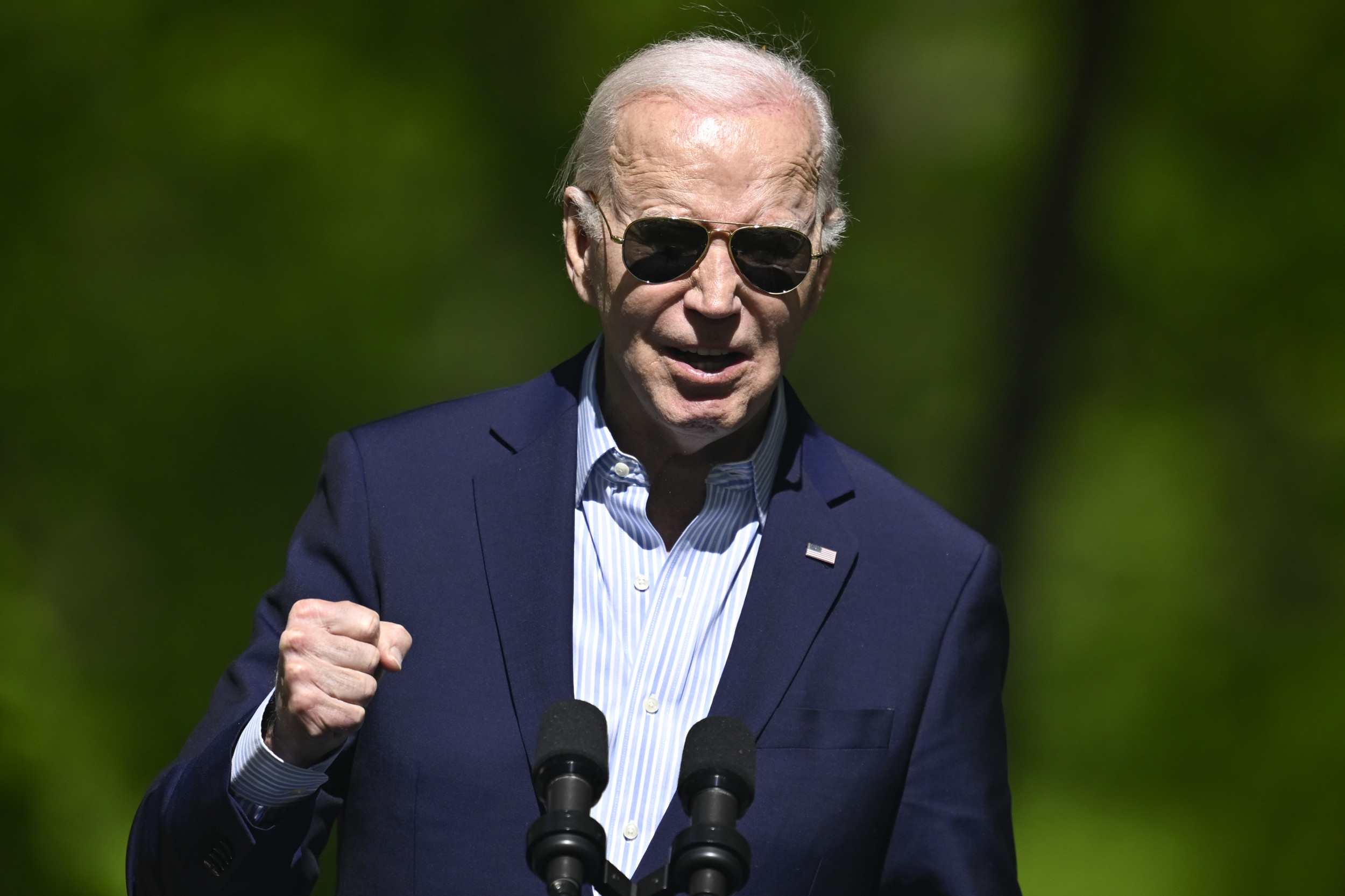Airlines including American and Delta are asking their passengers to wear face masks, as the coronavirus which causes COVID-19 continues to spread.
Since the pandemic started late last year, more than 3.4 million people have been diagnosed with COVID-19, 1.3 million have survived the disease, and 244,122 have died, according to Johns Hopkins University. As the graph by Statista below shows, the U.S. is the country with the most known cases.
Below are the face covering rules of major U.S. airlines, and when they come into place. Most state their guidelines follow the recommendations of the U.S. Centers for Disease Control and Prevention, which last month advised members of the public to wear a cloth face mask in situations where social distancing measures are difficult to follow, such as at the supermarket.

American Airlines
From May 11, all passengers will be required to wear a face covering or mask while on-board American Airlines aircrafts, according to a statement released last week.
The company previously announced flight attendants would be required to wear face coverings on every mainline and regional flight from May 1, and customers would be given sanitizing wipes and face coverings.
"This offering will expand to all flights as supplies and operational conditions allow," it said.
Alaska Airlines
Customers will need to wear a face mask as of May 11, the airline said in news release. Employees of Alaska Airlines and sister carrier Horizon Air who can't keep six feet away from customers or co-workers will wear them from May 4.
"Guests will be expected to bring their own mask and will be required to wear it throughout the airport and flight experience," Alaska Airlines said in a statement.
"Additional supplies will be available for anyone who forgets a face mask. Specific details about the face mask requirements will be shared with guests later next week and in pre-trip communications before their date of travel. The temporary policy will be reevaluated periodically as guidance evolves."
Allegiant Air
Passengers and crew aren't asked to but are encouraged to wear masks. A spokesperson told CNET passengers will be given masks, hand wipes, and gloves.
Delta
The airline is asking customers and employees to wear a face mask or covering from May 4, according to a statement. The company previously introduced rules requiring employees who can't maintain six feet of distance between themselves and customers to use masks.
The company asks customers to bring their own face coverings, but says it will also give masks to those who need them.
Passengers must have coverings on from the check-in lobby to boarding gate areas, jet bridges and for the duration of the flight except when meals are served. They must also be worn in areas such as Delta Sky Clubs.
"Their use is also strongly encouraged in high-traffic areas including security lines and restrooms. People unable to keep a face covering in place, including children, are exempt," Delta said.
Customers will be notified about the change on Delta.com, in pre-flight emails, and the its Fly Delta app.
Frontier Airlines
As of May 8, all passengers must shield their nose and mouth with a covering at Frontier Airlines ticket counters, gate areas, and on flights, according to a news release. Employees have been wearing them since April 13.
"Very young children, for whom a face covering is inadvisable, will be exempt from the policy," Frontier Airlines said.
The company will alert passengers of the change though emails, on its website, and at check-in at the airport.
Hawaiian Airlines
Starting May 8, passengers are asked to wear face masks or coverings over their mouth and nose, the airline said.
The measure will be in place from check-in until passengers leave aircrafts. Those who don't have their own face coverings can pick up disposable masks at check-in counters and gates.
Young children and those with medical conditions or disabilities which prevent them from wearing masks don't need to follow the rule.

JetBlue
The carrier will require all customers to wear face coverings over their nose and mouth while traveling, starting on May 4, according to a news release.
This includes during check-in, boarding, on the flight and while getting off the plane. Customers will be reminded of the rule via email and at the airport.
JetBlue employees are already wearing face coverings at work. Small children who can't wear masks are exempt.
Southwest Airlines
Passengers are "highly encouraged" to bring a mask to wear while traveling, and will be required to do so by May 11.
"If you forget your mask at home, one will be available for you," the airline said on its website. Customer-facing employees must also wear face coverings.
Spirit Airlines
From May 11, customers must wear face coverings while traveling with the airline. Those who don't won't be allowed onboard, the airline states on its website.
United Airlines
According to its website, all United Airlines customers and employees must wear facial coverings on-board flights from May 4.
The carrier encourages passengers to bring their own face coverings, but customer service staff can provide them for those who don't have them when they board.
Small children, those with medical conditions which mean they can't wear coverings, and those unable to take them on and off independently don't need to wear them on-board aircraft.
Centers for Disease Control and Prevention Advice on Using Face Coverings to Slow Spread of COVID-19
- CDC recommends wearing a cloth face covering in public where social distancing measures are difficult to maintain.
- A simple cloth face covering can help slow the spread of the virus by those infected and by those who do not exhibit symptoms.
- Cloth face coverings can be fashioned from household items. Guides are offered by the CDC. (https://www.cdc.gov/coronavirus/2019-ncov/prevent-getting-sick/diy-cloth-face-coverings.html)
- Cloth face coverings should be washed regularly. A washing machine will suffice.
- Practice safe removal of face coverings by not touching eyes, nose, and mouth, and wash hands immediately after removing the covering.
World Health Organization advice for avoiding spread of coronavirus disease (COVID-19)
Hygiene advice
- Clean hands frequently with soap and water, or alcohol-based hand rub.
- Wash hands after coughing or sneezing; when caring for the sick; before, during and after food preparation; before eating; after using the toilet; when hands are visibly dirty; and after handling animals or waste.
- Maintain at least 1 meter (3 feet) distance from anyone who is coughing or sneezing.
- Avoid touching your hands, nose and mouth. Do not spit in public.
- Cover your mouth and nose with a tissue or bent elbow when coughing or sneezing. Discard the tissue immediately and clean your hands.
Medical advice
- Avoid close contact with others if you have any symptoms.
- Stay at home if you feel unwell, even with mild symptoms such as headache and runny nose, to avoid potential spread of the disease to medical facilities and other people.
- If you develop serious symptoms (fever, cough, difficulty breathing) seek medical care early and contact local health authorities in advance.
- Note any recent contact with others and travel details to provide to authorities who can trace and prevent spread of the disease.
- Stay up to date on COVID-19 developments issued by health authorities and follow their guidance.
Mask and glove usage
- Healthy individuals only need to wear a mask if taking care of a sick person.
- Wear a mask if you are coughing or sneezing.
- Masks are effective when used in combination with frequent hand cleaning.
- Do not touch the mask while wearing it. Clean hands if you touch the mask.
- Learn how to properly put on, remove and dispose of masks. Clean hands after disposing of the mask.
- Do not reuse single-use masks.
- Regularly washing bare hands is more effective against catching COVID-19 than wearing rubber gloves.
- The COVID-19 virus can still be picked up on rubber gloves and transmitted by touching your face.
Uncommon Knowledge
Newsweek is committed to challenging conventional wisdom and finding connections in the search for common ground.
Newsweek is committed to challenging conventional wisdom and finding connections in the search for common ground.
About the writer
Kashmira Gander is Deputy Science Editor at Newsweek. Her interests include health, gender, LGBTQIA+ issues, human rights, subcultures, music, and lifestyle. Her ... Read more
To read how Newsweek uses AI as a newsroom tool, Click here.








